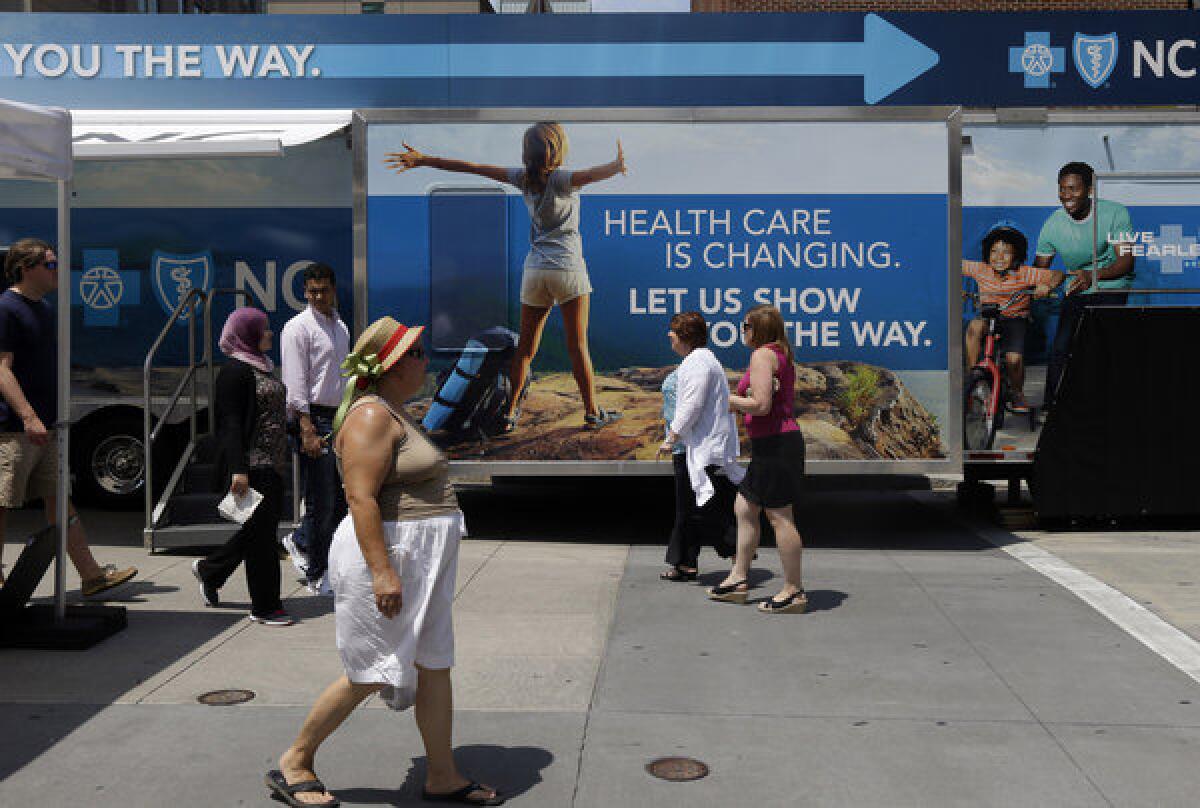Health insurance costs rise for employers and workers, survey finds

WASHINGTON -- American workers and their employers saw another rise in health insurance premiums this year, as the total cost of employer-provided health benefits ticked up 4% for family plans and 5% for individual plans, according to a closely watched national survey.
The 2013 increases are lower than in many previous years, undercutting claims by critics of President Obama’s healthcare law that the 2010 legislation is dramatically driving up costs.
Nor is there much evidence that many employers are dropping coverage -- 57% of firms with at least three employees offered health benefits in 2013, according to the report by the nonprofit Kaiser Family Foundation and the Health Research & Educational Trust. The report’s authors noted that is “statistically unchanged” from 2012, when 61% of employers offered health benefits, and 2011, when 60% of employers did so.
But, as has been true in most previous years, the rise in premiums outpaced inflation and wage growth, adding to the increasing burden that healthcare costs are putting on Americans.
PHOTOS: 2013’s memorable political moments
“It’s still three or four times the general rate of inflation,” said Helen Darling, president of the National Business Group on Health, a leading association of large employers. “We don’t consider [the increase] modest at all.”
The average total cost for a family health plan -- which in most cases is split between employer and employee -- hit $16,351 this year. The typical employee’s share of that premium hit $4,565, up about 6% from 2012.
The average employer’s share of the premium, in contrast, increased just 3%, an indication that employers continue to shift more health costs onto their employees.
The survey did not measure premiums for the roughly 20 million people who buy health insurance on their own, though this group is dwarfed by the more than 150 million people who get employer-sponsored coverage.
Starting in October, Americans who do not get health benefits through their employer will be able to shop for health plans on new Web-based marketplaces created by the Affordable Care Act. Low- and moderate-income consumers will qualify for federal subsidies to offset their premiums.
Obama once promised that his law would reduce Americans’ health costs.
The Kaiser survey is the latest indication that that is not happening yet. In addition to rising premiums, workers also are getting hit with more cost-sharing , the survey found. For example, the average deductible for a health plan that covers only the employee reached $1,135, up from $1,097 in 2012.
Particularly hard hit are workers at small businesses, who already pay more for their health coverage than employee of large firms. Nearly a third of workers at employers with fewer than 200 employees have deductibles of at least $2,000.
Employers with more lower-wage workers also force their employees to pay more for their health benefits. Workers at firms where at least 35% of the workforce earns less than $23,000 pay $1,363 more for an average family plan than workers at firms with fewer low-wage employees, the survey found.
PHOTOS: Team Obama, where are they now?
The 2013 rise in insurance premiums nonetheless is markedly lower than a decade ago, when double-digit annual increases were the rule. As recently as 2011, the average cost of a family plan surged 9.5%.
“This is good news for Obamacare because critics won’t be able to blame big premium increases on Obamacare because there aren’t any,” said Kaiser Family Foundation President Drew Altman.
The relatively modest premium increases also track other data showing a historic slowdown in health spending, which many experts believe reflects changes brought on in part by the new healthcare law.
The Obama administration cheered the results of the Kaiser survey. “Since the Affordable Care Act became law, healthcare costs have been slowing and premiums are increasing by the lowest rates in years,” said Joanne Peters, a Health and Human Services Department spokeswoman.
The law appears to be having other effects on employer-provided health benefits, as well.
A growing number of health plans are adopting new consumer protections required in the law, including coverage fir screenings, physicals and other preventive care without co-pays or cost sharing.
The law exempted employers that were offering health plans to their workers when the law was signed in 2010 as long as they did not make major changes to their plan.
Last year, nearly half of covered workers were in such “grandfathered” health plans. The survey found that just over a third of employees are in grandfathered health plans now.
Employers are also increasingly using wellness programs to reward employees who improve their health and penalize those that do not, a practice that is encouraged in the new law.
Nearly all employers with more than 200 workers now run at least one wellness program, and more than half now report they offer biometric screenings to measure their employees’ health risks.
“This will be an important issue to watch next year, as employers will have more flexibility and could ask workers to pay more because of their lifestyles and health conditions,” said Kaiser Vice President Gary Claxton, the report’s lead investigator.
The survey also found significant employer interest in enrolling workers in so-called private insurance exchanges in which the employer contributes a set amount to an employee for health benefits and allows the employee to shop among multiple insurance plans.
While very few employers are currently doing this, 29% of employers with more than 5,000 workers said they were considering offering benefits this way in the future.
Follow Politics Now on Twitter and Facebook
Twitter: @noamlevey
Twitter: @marinav13
More to Read
Sign up for Essential California
The most important California stories and recommendations in your inbox every morning.
You may occasionally receive promotional content from the Los Angeles Times.











